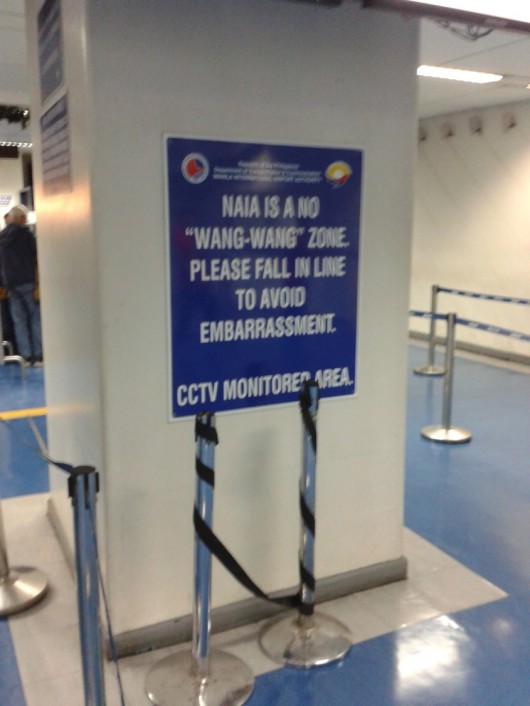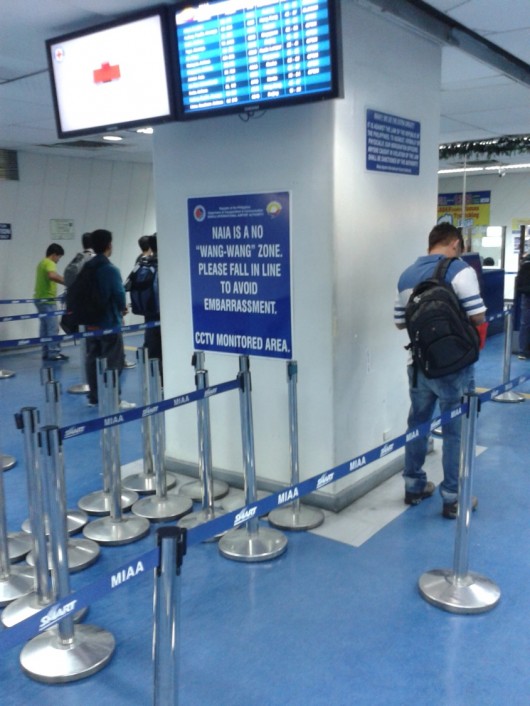
Overheard in the international departures line at the Ninoy Aquino International Airport in Manila: “What do you suppose ‘wang-wang’ means?”
“Don’t do what the Chinese do in lines.”
The person who took this picture, Alex O., says, “I’m curious what this means and how similar it is to the ‘pai dui’ and ‘wenming chaoyang’ campaigns here.”
If anyone knows, drop us a line.
Another look:


















































‘wang wang’ is a vernacular saying in the philippines that refers to ‘cutting in line’ – the saying is derived from what was once a common behavior of some private cars owners who mounted sirens on their vehicles to cut-in-line during heavy traffic.
the siren goes ‘wang wang’
According to a friend, ‘wang wang’ is a vernacular saying in the Philippines that refers to ‘cutting in line’ – the saying is derived from what was once a common behavior of some private cars owners who mounted sirens on their vehicles to cut-in-line during heavy traffic.
im not your friend.
I’ve heard, from multiple sources close to me, that ‘wang wang’ is a vernacular saying in the Philippines that refers to ‘cutting in line’ – the saying is derived from what was once a common behavior of some private cars owners who mounted sirens on their vehicles to cut-in-line during heavy traffic.
I overheard these people who said ‘wang wang’ is a vernacular saying in the philippines that refers to ‘cutting in line’. According to them the saying is derived from what was once a common behavior of some private cars owners who mounted sirens on their vehicles to cut-in-line during heavy traffic. Evidently car sirens there produce a “wang wang” noise.
According to an article I read on the internet, ‘wang wang’ is a vernacular saying in the philippines that refers to ‘cutting in line’ – the saying is derived from what was once a common behavior of some private cars owners who mounted sirens on their vehicles to cut-in-line during heavy traffic. And the siren goes ‘wang wang’.
I heard from my funny expat dfrients that ‘wang wang’ is a vernacular saying in the philippines that refers to ‘cutting in line’ – the saying is derived from what was once a common behavior of some private cars owners who mounted sirens on their vehicles to cut-in-line during heavy traffic. And the siren goes ‘wang wang’.
Wait so you are saying my friend is true? He said that ‘wang wang’ is a vernacular saying in the philippines that refers to ‘cutting in line’ – the saying is derived from what was once a common behavior of some private cars owners who mounted sirens on their vehicles to cut-in-line during heavy traffic. And the siren goes ‘wang wang’.
Guys, wait, hold on, in my dream last night someone told me that ‘wang wang’ is a vernacular saying in the Philippines that refers to ‘cutting in line’ – the saying is derived from what was once a common behavior of some private cars owners who mounted sirens on their vehicles to cut-in-line during heavy traffic.
you guys keep reproducing my typo.
No, actually you guys are wrong, I heard from my running-dog foreigner friend that ‘wang wang’ is a vernacular saying in the philippines that refers to ‘cutting in line’ – the saying is derived from what was once a common behavior of some private car owners who mounted sirens on their vehicles to cut-in-line during heavy traffic. And the siren goes ‘wang wang’
thank you.
You guys are quite funny